Science-themed board games are an increasingly popular way to learn about everything from atom building to colonising space
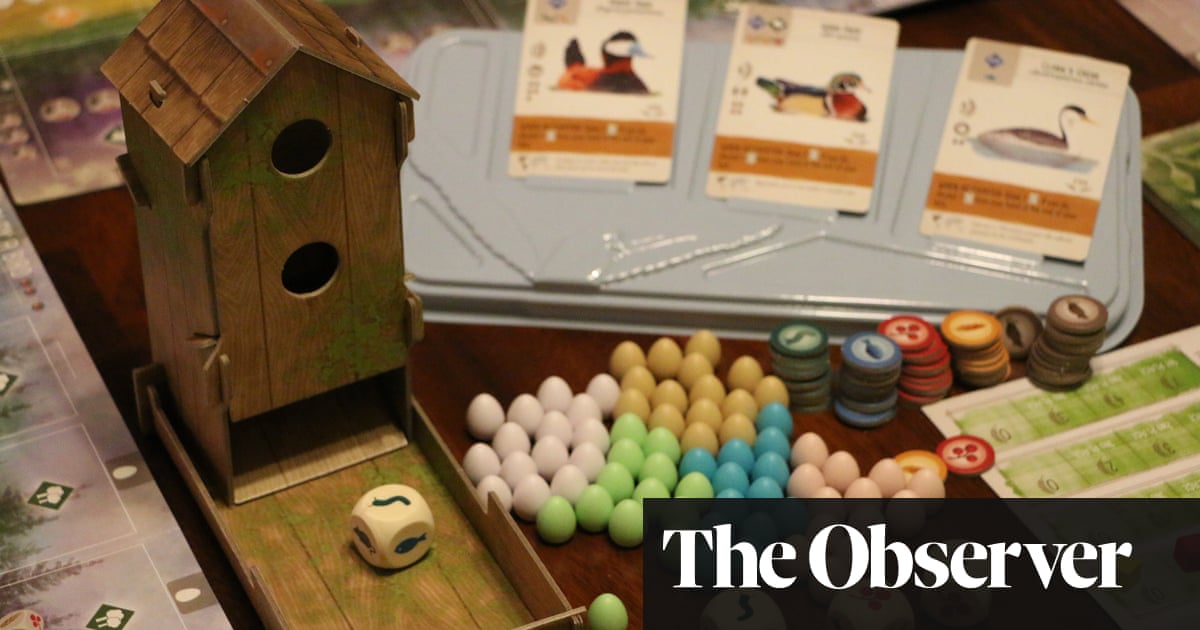
When Elizabeth Hargrave created a board game inspired by her love of birdwatching, she had no expectation it would become a tabletop phenomenon. Yet Wingspan sold out within a week of its release in January, earned glowing reviews and was the subject of a New York Times article.
Its just so far beyond what you could ever hope for, right? says Hargrave, a health policy researcher in Washington DC. Given that most modern board games have geek-friendly fantasy, science fiction or historical themes, she admits she was uncertain as to how it would go with a theme so far outside the mainstream. But that theme got people really excited, as it turned out.
Its one that is rooted in solid science, too. Self-confessed spreadsheet geek Hargrave dived deep into her research to make sure each of the games bird cards bore close relation to its real-world counterpart, from the acorn woodpecker to the yellow-rumped warbler. You dont need to be into birds to enjoy it, but youll come away from a game of Wingspan knowing far more about them. I want it to be accidentally educational, says Hargrave. I wasnt trying to make a game thats teaching actively, but more drawing on the fact that people connect to these things because theyre real things in the world around them.
Wingspan is part of a new wave of Stem-inspired (science, technology, engineering and mathematics)board and card games that has been building over the past five or six years, with themes including cell biology, evolution, epidemics and the colonisation of Mars. While the connection between science and gaming isnt new, it has become far more innovative and elegant.
EduGames have been around for a long time, though according to Sam Illingworth, senior lecturer in science communication at Manchester Metropolitan University, they are basically crap, normally designed by people who have never played games before and think, Lets do a reskin of Monopoly!
While their science is sound, Illingworth says, most EduGames are forgettably dull to play, thus rendering them pointless.
It was a problem that John Coveyou, a designer based in St Louis, Missouri, was keen to solve. A former chemistry teacher, Coveyou even went as far as to form a company, Genius Games, devoted to player-friendly Stem games. After realising how intimidated many of his students were by scientific concepts, and noticing how he and his gaming friends would remember useless information about sci-fi worlds and things that didnt exist, he reasoned that well-crafted strategy games would be ideal for making science approachable. So far, Coveyou has designed and published games about ionic bonding, covalent bonding, protein building, atom building, DNA and cell biology.
Its really fun to take the science and try to make a game out of it, he says. I will sometimes spend weeks on research, then mapping out what all of the components and the processes in the game look like and how they interplay. He will never, he insists, take liberties with the science for the sake of the gameplay. We cant do anything we want, right? We cant say, Lets just make the zombie have a chainsaw now. We go back to the textbook to find a way to make the science match what were trying to do.
To Illingworth, who regularly uses board games to engage the public with science concepts, a great Stem game isnt one that bombards you with information; rather, its one that elegantly communicates the key messages through its mechanics. He cites Terraforming Mars, designed by Swedish science teacher Jacob Fryxelius, as a great example. What board games do really well is they encourage you to process the facts you learn in your own way to join the dots, says Illingworth. When you play Terraforming Mars, you think to yourself: Wow, terraforming Mars is really difficult. Why do we want to do that when weve got our own planet to look after?
The Stem trend in gaming shows no sign of abating. I just finished a game about monarch butterfly migration, says Hargrave, who is also working on a game based on a 1950s Soviet genetics experiment involving the domestication of foxes. Coveyous next release, meanwhile, is Periodic: A Game of the Elements, to tie in with the 150th anniversary of the periodic table.
The inspiration science provides to game designers is endless, Coveyou says. There are thousands of different ideas out there, and they already provide you with this amazing framework. Theres an outrageous amount of science concepts. The sky is the limit.
Stem-powered
Five essential science-based board games

Cytosis: A Cell Biology Board Game (2017)
Designer: John Coveyou
Coveyous most successful game to date, Cytosis is a worker-placement game, which means each player has a set of worker pawns they place on the board in specific locations to trigger different actions or rewards.
Here, that board is a colourful depiction of a human cell, and those workers are placed on organelles, where they can collect carbohydrates or ATP, or purchase cell-component cards. Their resources can then be used to build enzymes, hormones and hormone receptors, or to help detoxify the cell, all of which earn the player health points; at the games end, whoever has the most health points wins.
As the box-front boasts, Cytosis is so faithful to the real processes that occur in a human cell, its been endorsed by The Journal of Cell Science.
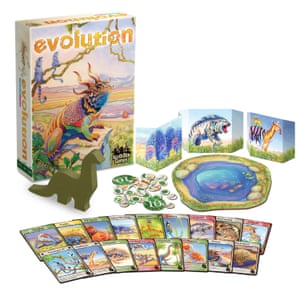
Evolution (2014)
Designer: Dominic Crapuchettes, Dmitry Knorre, Sergey Machin
According to the scientific journal Nature, this games evolution theme isnt just tacked on, it drives play. By collecting and combining different trait cards (such as Hard Shell, Horns and Carnivore), players compete to combat starvation and predation, and win by creating the most adaptable and populous species.
Each species is represented by a small player board which tracks their size and population, while food tokens are collected for points at the games end. With 129 trait cards, theres a lot of variety around 12,000 potential species to create and you can split your play style between spawning peaceful plant-eaters or creating carnivores to feed on other players beasts. Though there is always the danger that with no other valid prey on the table, your carnivore may have to feed on your own plant-eaters.
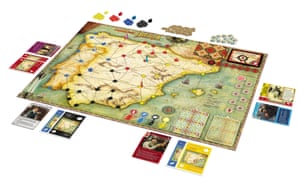
Pandemic: Iberia (2016)
Designer: Jsus Torres Castro, Matt Leacock
Matt Leacocks disease-combating game Pandemic is a hugely successful title, which has been recast several times since its publication in 2008.
One recent iteration is Pandemic: Iberia, which switches from the originals modern global setting to the Iberian peninsula of 1848. Each player must take a specific role nurse, sailor or railwayman, for example and travel around Iberia, cooperating to find cures for four diseases: malaria, typhus, yellow fever and cholera.
Sam Illingworth has used this game to help teach schoolchildren about the different causes of disease and the importance of water purification, but he says Pandemic also has a brilliant central message that its not just one scientist in a lab, fighting disease, its lots of people working together.
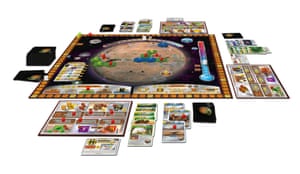
Terraforming Mars (2016)
Designer: Jacob Fryxelius
This isnt just a great science game, its a great game full stop, and is currently ranked the fourth best in the world by hobbyist gamer website BoardGameGeek.
Each player takes the role of a 24th-century corporation, whose efforts combine with those of the other players to make Mars habitable through raising the temperature (to 8C), ocean coverage (to 9% of the planets surface) and oxygen level (to 14%).
At the same time, they are each seeking to earn the highest Terraforming Rating by building infrastructure on the planet via tile placement on an accurately rendered Mars map, and executing successful projects by playing project cards, which synergise in many different and rewarding ways.
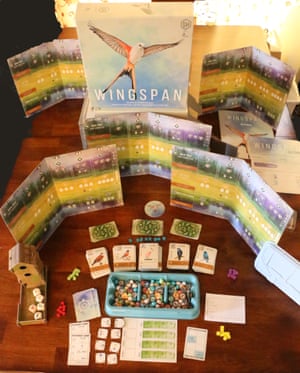
Wingspan (2019)
Designer: Elizabeth Hargrave
Few games look more appealing when spread out on your table than Wingspan. It features a bird feeder dice tower, dozens of pastel-coloured egg miniatures and 170 cards, each with vibrant artwork and deeply researched information on birds. But there is far more to this game than impressive plumage.
Each player has his or her own board, representing a habitat divided into woodland, grassland and wetland, on to which they must play bird cards, each with a different point value. These birds can also earn extra points through laying eggs, storing food and activating their powers (for example, a bird of prey can allow you to draw a card from the deck and, if its wingspan is under a certain size, keep it for a bonus point at the games end).
Its elegant, easy to learn and a joy to play; it deserves to be a hit.
Read more: https://www.theguardian.com/science/2019/apr/20/board-games-turning-science-into-playtime


Recent Comments